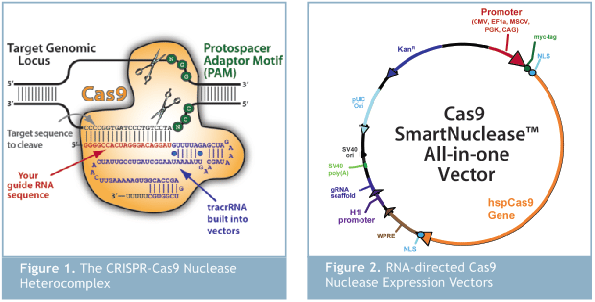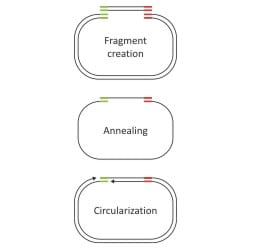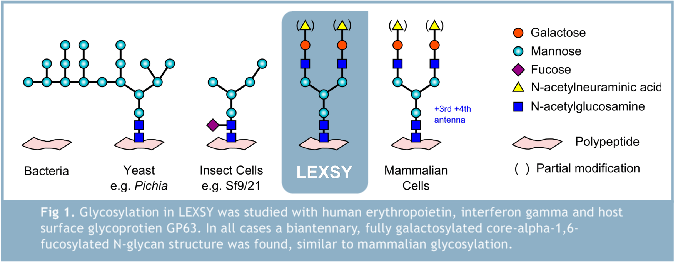Genetic Engineering – Master the Essentials
Overview
In Molecular Biology, the ability to successfully manipulate DNA is essential. Stratech offers cutting edge cloning systems, genome editing tools, vectors and expression systems for a firm foundation to your next project.
- Genome Editing
- Clones
- Cloning Systems
- Transfection
- Expression Systems
Suppliers
- Affymetrix USB
- CusaBio
- Jena Bioscience
- IBA
- Signosis
- Systems Bioscience (SBI)
- USBio
- USCN
Genome Editing
In this relatively new form of genetic engineering, DNA is inserted, replaced, or removed from a genome using artificially engineered nucleases, or “molecular scissors.” The nucleases create specific double-stranded break (DSBs) at desired locations in the genome, and harness the cell’s endogenous mechanisms to repair the induced break by the cellular processes of homologous recombination (HR) and nonhomologous end-joining (NHEJ). Genome editing nucleases are engineerable to modify their DNA-binding specificity and can in principle cut any targeted position in the genome. This allows modification of the endogenous genes sequences that are impossible to specifically target by conventional RNAi. Stratech’s offering includes 3 different genome editing systems from SBI:
- EZ-TAL uses Transcription Activator-Like Effectors (TALEs), with an elegant tandem repeat base-targeting code for easy targeting design
- CRISPR/Cas9 SmartNuclease – Revolutionary new system that uses guide RNAs for homology-directed targeting to your locus of interest (Figure 1 and 2)
- phiC31integrase system – integrates a construct of any size as a single copy, without viral transgenesis.

Clones
From Sino Biological, Stratech offer over thousands of high quality cDNA Clones / ORF Clones with confirmed sequences.
- Human, Mouse, Rabbit, Rat, Monkey, Dog, Ferret, Zebra fish
- Specialising in cDNA to Viruses (Influenza, HIV, HCV, RSV, HCoV)
- All available in expression-ready vectors; optimised for expression with multiple tags (FLAG, His, HA, Myc, aYFP, aGFP, aRFP)
SBI offers an extended set of cloning and expression lentivectors for efficient delivery of expression constructs in mammalian systems. To achieve highly efficient delivery and stable expression, the lentiviral constructs can be packaged in VSV-G
Cloning Systems
Recombineering is a simple, rapid cloning method which allows you to directly and directionally clone your insert of choice into any linearised vector, at any site, without the need for generation of complementary ‘sticky’ DNA ends. It relies on homologous base pairing betweeen linearised vector and PCR products made using primers with sequence tags complementary to that vector at the expected ‘join site’. The vector-insert combination is stitched together in a highly efficient repair reaction, ready for transformation. This method makes your routine cloning simple, and is especially suitable for hard-to-clone inserts. Stratech supply the Cold Fusionrecombineering system from SBI, which has the following advantages:
- 95% cloning efficiency
- Incredibly rapid – transformation-ready DNA in 15 minutes
- So efficient and robust that it can be used to “stitch together” multiple PCR products and vector in one reaction
Further information on this range is available on our Cold Fusion Cloning Kit page. The CyClone Ligase-free Cloning Kit from Jena Biosciences works on a similar principle, but instead of recombination it relies on a polymerase-catalysed recircularisation reaction between complementary ssDNA vector and insert sequences. Key benefits are:
- Cost-effective alternative to Cold Fusion
- 95-99% cloning efficiency
CyClone Ligase-free Cloning Kit is based on a new cloning technique invented by Quan and Tian in 2009. It offers a number of advantages over conventional cloning methods. The system:
- works with any vector that can be linearized
- allows efficient cloning even into blunt end vectors
- allows directed cloning into single-cut vectors
- allows fast and easy preparation of vector and insert with no or only few purification steps
- does not require to dephosphorylate the vector
- allows the use of any restriction enzyme that linearizes the vector even if its recognition site(s) are present in the insert
- does not need a ligation step
- does not add additional sequences to the plasmid or the insert

The CyClone Ligase-free Cloning Kit generates plasmids usable for transformation in only two simple steps:
- Creation of a PCR product with ends homologous to the cloning vector.
- Annealing and fusion of insert and vector in a circularization reaction
No time consuming ligation step is necessary!
A specialized software, allowing convenient primer design and ordering for the use of CyClone with Jena’s LEXSY vectors is available contact info@stratech.co.uk for further information.
Expression Systems
Whether you’re looking to produce recombinant proteins, or to express your modified gene of interest in a new genome, you need to use a reliable protein expression system. If your aim is to deliver genetic material for either stable, heritable expression or mid-term transient expression (weeks rather than days), then System Biosciences (SBI) have two superb options.
For Stable, heritable expression, their engineered lentivectors enable the efficient and robust delivery of genetic material to most cell types, including non-dividing and hard-to-transfect cells (primary, blood, stem cells) in vitro or to transgenic mice models in vivo. SBI offer an extensive set of cloning and expression for efficient delivery of expression constructs in mammalian systems. To achieve highly efficient delivery and stable expression, the lentiviral constructs can be packaged in VSV-G pseudoviral particles and transduced into a wide range of cell lines or model organisms (mouse, rat, etc.). Lentivectors are available derived from commonly-used HIV (human immunodeficiency virus) and FIV (feline immunodeficiency virus). Both types of lentivectors have similar structures and performance, but can have different transduction efficiencies for different cell types. They offer you:
- Constructs integrated into genomic DNA – High expression levels in chromosomal environment, with low variability
- Non-disruptive to cells: Cell functions are unaffected by the infection process
- Biosafe: Replication-incompetent design prevents proliferation of virus for both HIV and non-human FIV lentivectors
For sustained expression over a period of weeks, rather than days, as with standard plasmid vectors, SBI offer their Minicircles. Minicircles are episomal DNA vectors that are produced as circular expression cassettes devoid of any bacterial plasmid DNA backbone.
- Smaller molecular size enables more efficient transfections sustained expression.
- Expression for up to 14 days in dividing cells and even longer for non-dividing cells.
- ZYCY10P3S2T E. coli cells available for minicircle production. For use in vivo or in vitro.
- Choose your promoter, reporter gene, and vector format. Parental plasmid is degraded, preventing immune responses.
The Minicircle DNA Vector Technology page provides further information.
To produce mammalian protein for structural or biochemical studies, a eukaryotic expression system is needed. Jena’s LEXSY system uses non-pathogenic (CL1) leishmania, giving all the advantages of E.coli-like handling with mammalian expression machinery and post-translational modifications:

Further information is available on Stratech’s page on LEXY.
Transfection
To achieve successful transfection, with high efficiency and low cell mortality rates requires a reagent optimised for your cell type and application. Stratech is able to offer several different reagent formats to suite your precise requirements. We offer PureFection from SBI, which self-assembles nanoparticles in the presence of DNA and RNA. These complexes are readily taken up by target cells for efficient gene delivery. Sinofection transfection reagent from Sino Biological is a Cationic polymer-based transfection reagent, suitable for transfecting nucleic acids between 15bp – 500kb. For the transfection of Peptides, we offer the novel peptide-based, non-endosomal delivery mechanism from Affymetrix USB – DeliverX Peptide Transfection Kit. For the efficient delivery of siRNA in to difficult-to-transfect cell machanisms, Affymetrix USB also offer DeliverX siRNA Transfection kits. These kits are based on a novel “MPG” delivery technology developed at Centre de Recherches en Biochimie Macromol (CNRS) in Montpellier (France) in the laboratory of Dr. F. Heitz and Dr. G. Divita. Magnet Assisted Transfection (MATra) from IBA is an easy-to-handle and highly efficient method to transfect cells in culture. Using this technique, nucleic acids such as plasmid DNA, oligonucleotides or siRNA, are first associated with magnetic nanoparticles. Exploiting magnetic force the full nucleic acid dose is then rapidly drawn towards and delivered into the target cells leading to efficient transfection. Further information at Magnet Assisted Transfection (MATra) page.
| Delivery System |
Cargo |
| Cationic Polymer |
DNA, siRNA |
| Nanoparticle |
DNA, siRNA |
| Magnetic |
DNA, siRNA |
| Peptide-based |
siRNA, Peptide |
For full details of transfection systems click here.

 The CyClone Ligase-free Cloning Kit generates plasmids usable for transformation in only two simple steps:
The CyClone Ligase-free Cloning Kit generates plasmids usable for transformation in only two simple steps: